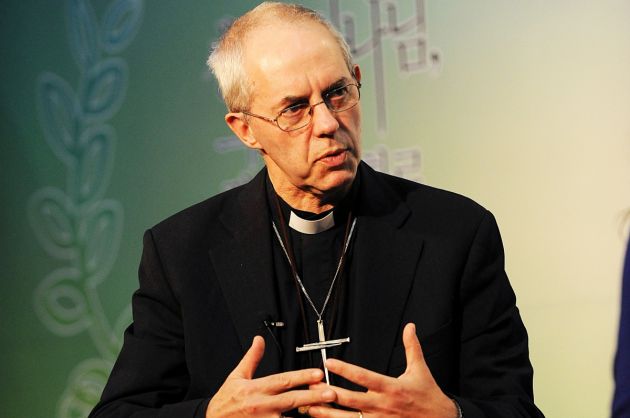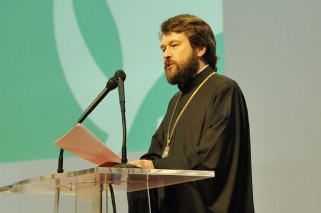Gay group upset about churches group 'dodging' homosexuality

BUSAN, South Korea – A band of rowdy Korean protestors railed against the World Council of Churches Assembly the day before it started its 11 day meeting, shouting the Christian grouping is too sympathetic to homosexuals.
But representatives of the lesbian, gay, bisexual and transvestite community at the exhibition center next to the 10th Assembly of the World Council of Churches expressed anger and disappointment that the WCC has no policy either for or against the support for gay people.
The protestors in Busan, said they were Korean Christians opposed to churches inside the WCC and its attitudes to social norms and other faiths.
The WCC is a grouping representing some 560 million Christians from all over the globe and in the 21st century it sees contact with other faiths as well as all Christian groups as vital for Christianity.
"We are angry and disappointed at the position taken by the WCC on this issue," Heleen de Boer , a Dutch representative and co-president of Lesbian Gay Bisexual and Transgender Christians at the Busan meeting said in an interview with Ecumenical News on November 1.
"People are being persecuted, beaten and sometimes killed in Africa and other places and now we hear the WCC has no policy on support for homosexuals."

She was reacting to a statement made by the WCC moderator, Rev. Walter Altman, who told journalists at a news conference on October 31.
"The WCC has no policy or programme of support for homosexuals. We don't have any policy or programme against homosexuals, either."
The WCC is bound by a policy made on the basis of consensus of its 345 member churches in more than 110 countries so any single church an actually veto decisions made at assemblies the churches' councils highest decision-making body.
"We understand this is an issue which has become very controversial inside many churches and communities of churches and the WCC has no authority to speak on behalf of churches on particular issues – on that issue or any other issue.
"So it is not on the agenda of the WCC but we do think this is an important issue and that it is important to discuss it in the spirit of Christianity and mutual respect when you engage in a dialogue while acknowledging the very deep differences of understanding on that issue which exists in the churches and among the churches.
"But I repeat again. There is no programme, no policy of the WCC in that respect, other than engaging in fruitful dialogue."
QUESTION BY RUSSIAN JOURNALIST
Altman had been asked by a Russian journalist about the WCC's reaction to Korean Christians who have staged several peaceful demonstrations outside Busan's Bexco Convention Center where 5,000 delegates and participants from around the world are meeting until November 8.
As people enter and leave the building they hear chants in Korean against the WCC and its supposed support for gay people.
Standing next to WCC general secretary Rev. Olav Fyske Tveit at the assembly press center, Altman said it was important that Christians discussed homosexuality in the light of reading Scripture.
Tveit added at the same press conference, "The World Council of Churches only have policies or common statements when there is a consensus in the fellowship.
"There is no consensus on how churches address this issue of homosexuality at this point.
"But homosexuals are not outside the Church. They're inside the Church and in all the churches. So it's very important about how we talk about these issues because they're not only issues, they're human beings, brothers and sisters who belong to our fellowship.
"So it is of concern to all of us."
Commenting on what the WCC moderator and general secretary had said, de Boer told Ecumenical News of a chance encounter between a Korean critic of homosexuals and a German minister who is lesbian.
"We heard the shouts and knew what they were saying. How odd that some Koreans think that the WCC supports homosexuals and leaders of the WCC say they have no policy for or against.
"We contacted the protestors and one of our male supporters asked a Korean woman, quite hostile towards us, to come to our stand and talk to us. She did. At the end of half an hour the Korean Christian and one of our members, a protestant minister called Kirsten Soberblum, blessed one another.
'"It was lovely. It was beautiful. It was so unexpected."
She said the WCC could learn from that small but unexpected encounter.
"It's so important that the WCC has a policy - for or against. Once the WCC has established a position ...well, then you can begin a dialogue."
She said that in September, the LGBT group's partners from Indonesia, Holland, the U.S. and South Africa wrote to the WCC urging it to address "the needs for meaningful social and legal protections for LGBT people and their families."
LETTER TO TVEIT
A letter dated September 25, addressed to Tveit said: "Rather than trying to move forward to settle questions about whether our churches should honour homosexual relationships as equal to heterosexual relationships, we believe it will be most fruitful to proceed from values and beliefs that are shared, emphasizing our common commitments to the inherent dignity of all humanity, recognizing our creation in the image of God, the right of protection form harassment and violence and the promise of abundant life and unity that is in Jesus Christ."
At a short press conference on November 1 given by the Archbishop of Canterbury, Rev. Justin Welby, the subject of support for homosexuals was raised.
The spiritual leader of the world's 85 million Anglican Communion was asked what policy would be best for the WCC to follow on the subject of support for homosexuals.
Reference was made to the moderator's statement the day before and the on-going Christian Korean protests.
Welby answered, "I wouldn't like to second guess the moderator. I've got nothing to say on that."
While the Archbishop of Canterbury was not going to delve into a question that threatens Anglicans worldwide as its faces splits in many Northern churches on how it deals with issues such as gay marriage and clerics in homosexual relations the Russian Orthodox Church, the biggest Orthodox patriarchate in the WCC has no qualms about where it stands.
Metropolitan Hilarion of Volokolamsk, who heads external church relations of the Moscow Patriarchate, jetting in an out of Busan on his jet to make an addressing lambasting "militant secularism"
He said this "is aimed not only at religious holy sites and symbols by demanding that they be removed from the public domain. One of the main directions of its activity today is the straightforward destruction of traditional notions of marriage and the family.
"This is witnessed by the new phenomenon of equating homosexual unions with marriage and allowing single-sex couples to adopt children.
"From the point of view of biblical teaching and traditional Christian moral values, this testifies to a profound spiritual crisis. The religious understanding of sin has been conclusively eroded in societies that until recently thought of themselves as Christian."
WCC participants from some countries where single-sex marriage and gay partnerships within the clergy told Ecumenical News they were riled by Hilarion's speech.
But some African and Asian delegates said he had spoken well, reflecting why the WCC appears flummoxed on how to deal with the gay issue in a comprehensive manner.
